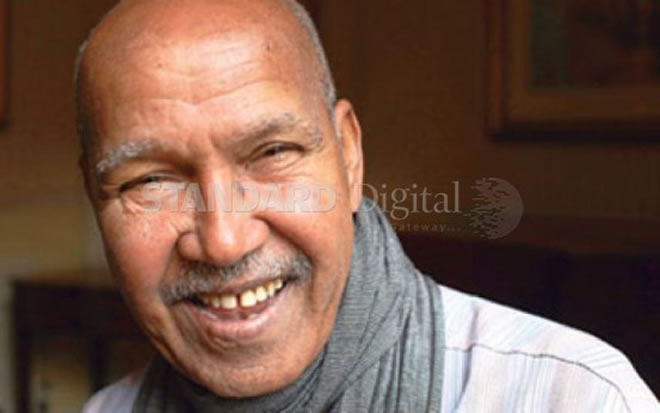
By Jennifer Muchiri
Saturday, October 17, 2015

Nurrudin Farah, the author of Hiding in Plain Sight
What does it mean to be Somali today? What identity does one proclaim when they have been uprooted from what is familiar to them? Which part of the world does one call home when they constantly feel like strangers, unwanted and treated with suspicion by their hosts?
The unending state of lawlessness and instability in Somalia has seen desperate citizens seek refuge in many parts of the world. Kenya has had her fair share of refugees from Somalia and, indeed, government officials and foreign missions have often had to live and run their operations from Nairobi.
What this means is that there exists a huge population of Somalis in Kenya and other foreign countries, who do not have a place to call home. One could say, some Somalis, especially those exiled when young and those born in foreign lands, really do not know who they are. This all important question of the Somali identity is among an array of issues that the acclaimed Somali writer, Nurrudin Farah examines in his latest novel, Hiding in Plain Sight (Oneworld Publications, 2015).
Hiding in Plain Sight tells the story of Bella, an outstanding fashion photographer in Rome, born of a Somali mother and an Italian father. Her brother Aar, who works for the United Nations, is killed in a terrorist attack in Somalia, ostensibly by political extremists.
Bella has to put everything aside and travel to Nairobi, Kenya, where Aar’s children study in a boarding school. With Aar’s wife having abandoned him and their children years ago, Bella knows that she is now the only parent that her niece and nephew have and she has to find a way of taking care of them.
Aar’s estranged wife now lives in India with her lesbian partner. While Aar’s will is very clear, that Bella should have the sole custody of his children in case of his demise, his estranged wife reappears and demands marital rights. Fortunately, she quickly realises that she has no credible claim to her maternal rights and allows Bella to take care of the children. Besides, while the children acknowledge the fact that she is their mother, they do not seem to have quite forgiven her for abandoning their father or for being a lesbian.
Farah’s novel revolves around the question of the Somali Diaspora and how their physical movement has affected their social, political, religious and cultural habits and expectations. Bella may have been raised in Somalia but her relocation to Europe and her travels around the world have almost wiped away her ‘Somaliness.’
Aar’s children only know Nairobi as home and their friends are not necessarily Somali. Indeed, when their father died, it is the headmaster of their school and his wife, a Mr and Mrs Kariuki, who hosted them in their house until Bella arrived in Nairobi. Yet, they are often reminded of their identity because of the suspicion with which Somalis are treated in Kenya and other countries.
Aar’s son rightly observes that even Kenyan Somalis do not have it easy in and they often have to prove their citizenship in their own country. Farah visualises a world where one’s ethnic, racial or religious identity and heritage take a back seat and allow for pure human love and camaraderie to reign. The novel mirrors just how much suffering political instability causes in individual lives, personal relationships, and family ties.
Hiding in Plain Sight explores the subject of sexual preferences, quite a daring subject, even in today’s liberal Africa, considering the supposed racial and religious affiliations of the characters. Aar’s ex-wife not only has a lesbian lover but travels with her to Nairobi. The author skillfully places the two characters in Uganda, where they are arrested for indecent exposure, as if to highlight the laws against homosexuality in Uganda. In Nairobi, we see them getting into the company of other homosexuals and there is mention of the police raiding a gay club. The two are so bold as to go to Aar’s home as a couple and even when the children discover that they are not ‘sisters’, as they initially claim to be, they do not deny that they are lovers.
On the other hand Bella has three lovers in different countries and she has no qualms about the nature of her relationships. The writer is concerned about choices, sexual or otherwise, and indicates that as Somalis migrate and settle elsewhere in the world, they are bound to influence and be influenced by the different peoples and cultures they encounter and settle among. In a sense, Nuruddin is making a case for the diffusion of political, cultural, religious and other tensions that infringe on personal freedoms.
Most importantly, the problem of political instability in Somalia forms the backdrop against which Farah assesses the nature of the Somali society today. His conviction is that this volatility will continue to tail Somalis wherever they seek a home; that the national will constantly affect the personal.